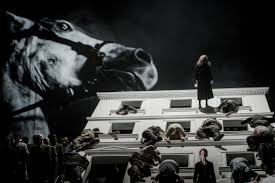London Coliseum, 18 November 2015
I gather that this new production will be broadcast by the BBC over the Christmas period. Listen to it, as musically it is a delight throughout, and has managed to assemble some of the finest singers we have heard even when compared to recent outstanding singing at the Coliseum.
The leads provide substantial voices with Tamara Wilson and Gwyn Hughes Jones frequently thrilling as Leonora and Alvaro. Anthony Michaels-Moore is a dark toned Carlo, his emotional turmoil always evident in the voice. James Creswell is a strangely ambivalent Father Superior and the production does not allow us to guess how sympathetic he may be to Leonora’s situation.
The chorus are on top form and Mark Wigglesworth brings splendid nobility and fire to the orchestra.
So far so good. This is joint production with the Metropolitan Opera and there are different expectations across the pond, where the music comes first and foremost. This may account for many of the strange decisions which Calixto Bieito makes in his production. Rebecca Ringst provides some of the largest sets I can recall at the Coliseum. Vast white buildings fill the stage, smoothly moved even with cast upon them. They have a sepulchral feel to them which is in keeping with the narrative and should be very effective. However very little happens within them. The chorus regularly appear as a block who simply stand and sing. There are many occasions when we seem to be at a costumed concert performances rather than a staging of the work. There is no battle in Act 3 and throughout the scene Carlo and Alvaro simply stand and stare at us.
When there is any action it is vicious and often at odds with the text. Rinat Shaham’s Preziosilla continuously assaults a pregnant woman before calmly executing a line of captured (or fleeing) civilians. Blood flows frequently, right from the first scene where Leonora smashes a plate and cuts her hand. Her preparation for her retreat as a hermit includes a crown of thorns made of barbed-wire. Only Friar Melitone – a splendid crisp characterisation from Andrew Shore – makes sense under the circumstances. The Friar is normally played as a comic character but here his attack on the depravity of the inn scene makes depressing sense.
This has proved to be a bumpy season so far. Some superb music making but more dubious decisions both by way of productions and choices for revivals. Let us hope it picks up after Christmas.

